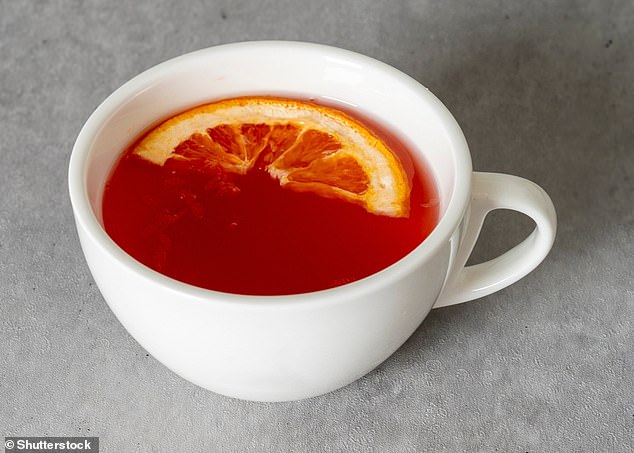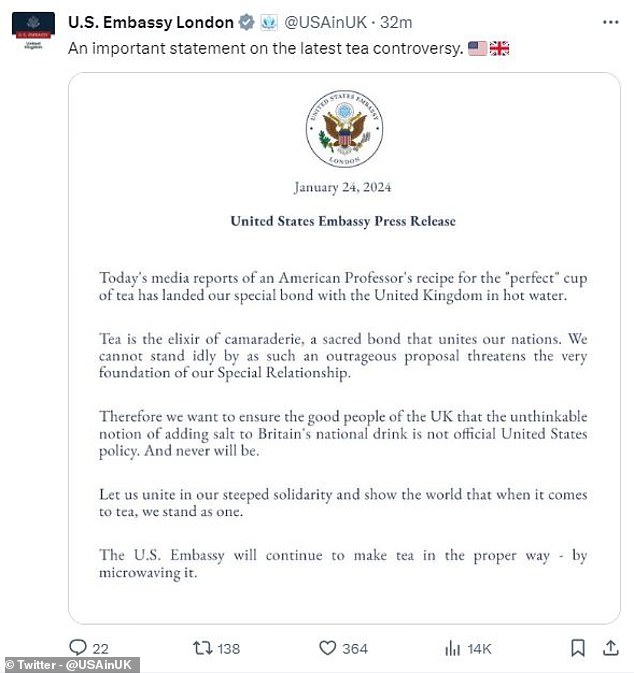She’s already sent British tempers rising by suggesting the perfect cup of tea contains a pinch of salt.
Now, Michelle Francl, a professor of chemistry at Bryn Mawr College in Pennsylvania, has an even more eccentric suggestion – try adding grapefruit.
The addition of the citrus fruit to tea, she says, can prolong the effect of the caffeine and keep you feeling awake for longer.
Professor Francl explains that some fruits and vegetables like cabbage and broccoli help the body flush out caffeine more quickly.
Others, like grapefruit, do the opposite by inhibiting an enzyme in the body called CYP3A4 which ‘slows the clearance of caffeine’.

Grapefruit in tea? A scientist says it can slow the clearance of caffeine in the body and keep you feeling awake for longer

Michelle Francl, a professor of chemistry at Bryn Mawr College, sent British tempers rising by suggesting the perfect cup of tea contains a pinch of salt
‘If you eat a lot of grapefruit you can increase the time the caffeine remains in the system,’ Professor Francl said during an online webinar hosted by Chemistry World on Thursday.
‘And if you add cabbage, broccoli and brussels sprouts to your diet you can clear caffeine more quickly.’
Professor Francl is not recommending actually adding green vegetables to your cuppa if you want to remove caffeine.
Rather, eating them around the same time as tea can flush out the stimulant faster – for example, if you drink tea in the evening but want to get a good night’s sleep.
Professor Francl has just published a new book called ‘Steeped: The Chemistry of Tea’, in which she suggests adding a pinch of salt to your brew to ‘reduce the bitterness’.
The sodium ion in salt blocks the chemical mechanism that makes tea taste bitter, she claims.
She also suggests warming the milk beforehand, on the basis that adding cold milk straight from the fridge runs the risk of curdling.

It is woven deeply into the fabric of British culture. But now a scientist from the US claims to have found the secrets to a perfect cuppa
MailOnline put the professor’s recipe to the test and found that it produced a very hot and unpleasantly salty brew.
One piece of advice from Professor Francl that the majority of Brits will agree with is to never microwave your tea – something Americans are prone to doing.
Using a microwave can promote the formation of ‘tea scum’ – an unsightly film on the top made up of calcium carbonate and organic matter, she says.
Another less controversial suggestion is to pre-heat your cup or pot to release more ‘aromatic compounds’ from the tea.
Professor Francl also thinks loose-leaf tea is better than teabags, but that if you do use a teabag it doesn’t matter what shape you use.
This flies in the face of the ingenious pyramid tea bag, first launched in 1996 by PG Tips, which gives the leaves inside more room to circulate.
Professor Francl’s tea recipe – particularly the suggestion of adding salt – caused such an uproar on social media that it was even addressed by the US Embassy in London.
It said adding salt to Britain’s national drink ‘is not official United States policy’ and ‘never will be’.

Dr Frankl’s recipe for a ‘perfect’ cup of tea has proven so shocking that the US embassy in London even made a joking post on X (formerly Twitter) about the recipe
It added: ‘The US Embassy will continue to make tea in the proper way – by microwaving it.’
The UK’s Cabinet Office replied with a post of its own saying ‘tea can only be made using a kettle.’
In response, Typhoo Tea said tea would be ‘better off dumped in Boston Harbour than a microwave’, in reference to the Boston Tea Party of 1773.
At the time, American patriots sank barrels of tea into Boston harbor in protest of King George’s taxation.










